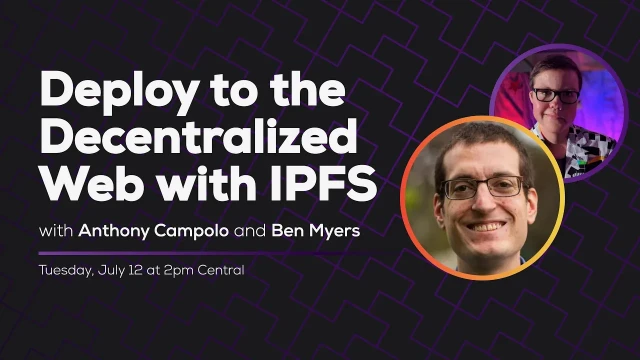
Deploy to the Decentralized Web with IPFS
Published:
Video Link: Deploy to the Decentralized Web with IPFS
Anthony Campolo rejoins Some Antics with Ben Myers to explore IPFS (the InterPlanetary File System) for decentralized web deployment.
Episode Summary
In this episode of Some Antics, host Ben Myers is joined by Anthony Campolo to discuss and demonstrate the InterPlanetary File System (IPFS), a decentralized and distributed network protocol. They explore the concepts of decentralization versus distribution, content hashing, and the practical application of IPFS in web development. The duo walks through the process of setting up an IPFS node, creating and deploying a simple HTML file to the IPFS network, and using services like Fleek to streamline the deployment process. Anthony explains the potential benefits of IPFS, such as content permanence and resistance to censorship, while also discussing its current limitations and the need for hybrid solutions. The conversation touches on the broader implications of decentralized web technologies, their relationship to Web3 concepts, and how traditional web developers might approach and understand these emerging technologies.
Chapters
00:00 - Introduction and IPFS Overview
Anthony Campolo joins Ben Myers to discuss IPFS (InterPlanetary File System). They begin by explaining the concepts of distributed and decentralized systems, drawing comparisons to familiar technologies like content delivery networks (CDNs) and BitTorrent. Anthony introduces IPFS as a peer-to-peer distributed file system, initially conceived as a decentralized version control system. They discuss the potential applications of IPFS, including its ability to create permanent, censorship-resistant content on the web. The conversation also touches on the current limitations of IPFS and the need for caution when using it for sensitive or mission-critical applications.
17:51 - Setting Up IPFS and Creating Content
The hosts dive into the practical aspects of using IPFS. They walk through the process of initializing an IPFS node on Ben’s computer, explaining concepts like peer identity and content hashing. They create a simple HTML file to serve as their test content for deployment on IPFS. Anthony guides Ben through the command-line interface, demonstrating how to add content to the IPFS network and pin it to ensure its persistence. They also explore the IPFS Desktop application, showing how it provides a user-friendly interface for managing IPFS content. This section provides a hands-on demonstration of the basic workflow for adding and managing content on the IPFS network.
35:56 - Deploying to IPFS and Using Fleek
Building on their earlier work, Anthony and Ben take the next step in deploying their content to IPFS. They explore how to make the content accessible via IPFS gateways, which allow standard web browsers to access IPFS content. The hosts then introduce Fleek, a service that simplifies the process of deploying and managing websites on IPFS. They walk through the process of setting up a Fleek account, connecting it to a GitHub repository, and deploying their simple HTML site. This section demonstrates how services like Fleek can bridge the gap between traditional web development workflows and the decentralized nature of IPFS, making it more accessible to developers familiar with platforms like Netlify.
54:55 - Updating Content and IPFS Considerations
The discussion shifts to the practicalities of updating content on IPFS. Anthony explains the challenges of content immutability in IPFS and how services like Fleek abstract away some of these complexities. They touch on topics like the InterPlanetary Name System (IPNS) and how it allows for mutable pointers to immutable content. The conversation briefly touches on related technologies like Ethereum Name Service (ENS) and NFTs, highlighting how IPFS can play a role in these ecosystems. This section provides insights into the more advanced considerations of working with IPFS and how it integrates with other Web3 technologies.
59:46 - Future Outlook and Conclusion
In the final segment, Anthony and Ben discuss the future implications of IPFS and decentralized web technologies. Anthony encourages web developers to keep an eye on how traditional “Web2” companies adopt and integrate IPFS-like technologies. He suggests that while IPFS might not be immediately necessary for all developers, understanding its concepts could be valuable in the long term. The hosts discuss the potential for IPFS to coexist with current web technologies, creating a hybrid internet where users seamlessly interact with both centralized and decentralized systems. They conclude by emphasizing the importance of staying informed about these emerging technologies while acknowledging the uncertainties in their timeline for widespread adoption.